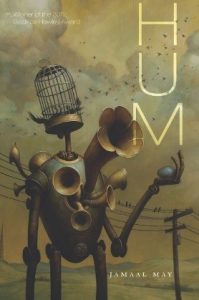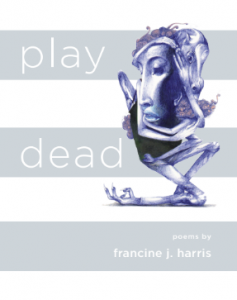| By Catherine DiMercurio |
While reviewing entries for Contemporary Authors, Vol. 403, I stumbled across the name of a poet, francine j. harris. Note: she renders her name this way; it isn’t a typo. The poet’s rejection of uppercase letters is not what snagged my attention, though. Words from her biographical sketch leaped out at me: Detroit. Cave Canem fellow. Alice James Books. They stuck with me because these words are also associated with another poet—Jamaal May—whose work I am more familiar with.
I was lucky enough to attend lectures and readings May gave during my grad school residencies in Vermont, and luckier still to hear him read his work in Detroit, particularly those poems from the 2014 collection Hum. (Please find a copy of Hum and immediately read “Macrophobia (Fear of Waiting.”) I say luckier still because finding May close to home, outside of the warm, creative nest of grad school was a gift, one that reconnected me to my writing self. We all need such gifts sometimes, little things that remind us of the words that have been on the tips of our tongues and waiting to be voiced.
May and harris are both Detroit poets, both have been published by Alice James Books, and both have been Cave Canem fellows. (The Cave Canem Foundation is a non-profit literary service organization that describes itself as a “home for black poetry,” while Alice James Books is a small publisher that focuses on “a broad range of voices from the poetry community.”) Knowing May’s work, and seeing similar credentials associated with harris, I knew I could expect exquisite writing if I continued following the path leading me to her work. When I started reading harris’s poems, I wasn’t disappointed. I also found some reviews of her poetry, and I noticed that one of the words most commonly associated with harris’s poetry was “raw.” This was true, I found. The writing lays open, right to the bone, the emotions spawned by love, sexuality, and various types of transformations.

I’m speaking specifically about harris’s 2016 collection, Play Dead, published by Alice James Books. In a way, though, “raw” suggests messy, and in my opinion harris’s writing is both too reflective and too controlled for such a descriptor to be entirely accurate. I suppose that is one of the beautiful things about poetry: you get to decide for yourself how it makes you feel. Maybe you will find harris’s poems to be raw and marked by a sense of urgency. Yet when I read poems such as harris’s “enough food and a mom,” I find them haunting, and full of memory, ache, and loss.
As painful as some of harris’s work is, it is also undeniably moving, thought-provoking, and smart, and I was happy to discover it in this stumbling, accidental way of paths crossing. Jamaal May, Detroit, poetry, Contemporary Authors, and francine j. harris, all intertwining one morning here in Farmington Hills. As many of the best discoveries are made in this happening-upon-them manner, I recommend perusing in any way, shape, or form in which you can do it: flip through a volume of Contemporary Authors, wander through the stacks in your library, or follow one path to the next as you explore Gale’s Literature Resource Center. Sometimes you discover exactly what you forgot you needed, and it may simply be the hint of inspiration seeing you through from one breath to the next.
Would you like to know more? Contact your Gale Representative today.
 About the Author
About the Author
Catherine is a developmental editor at Gale (and project editor of Contemporary Authors), an enthusiastic vegan runner, and a recent MFA graduate. If spare time is to be had, she may be found writing, reading, or enjoying some down time with her two teenagers.


